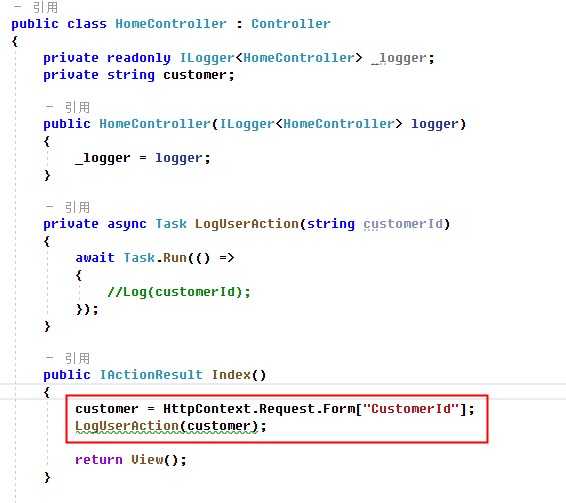HttpContext访问的正确姿势
2021-03-30 10:24
标签:image std log mode 构造 begin har ogg 方案 本文章转发自:https://www.cnblogs.com/tianqing/p/12570801.html 使用HttpContext的具体场景: 1. 在Controller层访问HttpContext 2. 在中间件中使用HttpContext 3. 在数据访问层使用HttpContext 4. 在后台线程中访问HttpContext 5. 在Razor页面模型中访问HttpContext 6. 在Razor视图中访问HttpContext 解决方案 1.在Controller层访问HttpContext 示例代码中HomeController继承与Controller抽象类 Controller父类中继承与ControllerBase抽象类 其中ControllerBase抽象类有提供了对HttpContext的访问 所以,我们在Controller这一层可以按以下方式访问HttpContext: 二:在中间件中使用HttpContext 自定义扩展中间件中,实现Invoke方法,HttpContext通过参数的方式传递到中间件的业务逻辑中。 三、 在数据访问层使用HttpContext 声明一个User的仓储类,实现对User的持久化。如下代码中, UserRepository依赖 IHttpContextAccessor 通过ASP.NET Core依赖注入容器解析依赖链并创建 UserRepository 实例时,就会注入依赖项。 使用ASP.NET Core内置的依赖项注入容器来注册依赖项。 依赖项注入容器向任意类提供 IHttpContextAccessor,以供类在自己的构造函数中将它声明为依赖项: 四:在后台线程中访问HttpContext HttpContext 不是线程安全的。 在处理请求之外读取或写入 HttpContext 的属性,可能会导致 NullReferenceException空引用异常。 如何再后台线程中使用HttpContext呢?推荐的做法: 1. 在请求处理过程中复制所需的数据。 2. 将复制的数据传递给后台任务。 五:在Razor页面模型中访问HttpContext Razor页面模型的父类PageModel提供了HttpContext的访问,如下代码: 六、在Razor视图中访问HttpContext Razor 视图通过视图上的 RazorPage.Context 属性直接公开 HttpContext HttpContext访问的正确姿势 标签:image std log mode 构造 begin har ogg 方案 原文地址:https://www.cnblogs.com/ITzhangyunpeng/p/12597605.html
public class HomeController : Controller
{
private readonly ILogger
public async Task Invoke(HttpContext context)
public class CustomerMiddleware
{
private readonly RequestDelegate _next;
public CustomerMiddleware(RequestDelegate next)
{
_next = next;
}
public async Task Invoke(HttpContext context)
{
// Do something with context near the beginning of request processing.
await _next.Invoke(context);
// Clean up.
}
}
public class UserRepository: IUserRepository
{
private readonly IHttpContextAccessor _httpContextAccessor;
public UserRepository(IHttpContextAccessor httpContextAccessor)
{
_httpContextAccessor = httpContextAccessor;
}
public void AddUser(User user)
{
var username = _httpContextAccessor.HttpContext.User.Identity.Name;
//Save User to DB
}
}
public void ConfigureServices(IServiceCollection services)
{
services.AddControllersWithViews();
services.AddHttpContextAccessor();
services.AddTransient

@{
ViewData["Title"] = "Home Page";
var username = Context.User.Identity.Name;
}